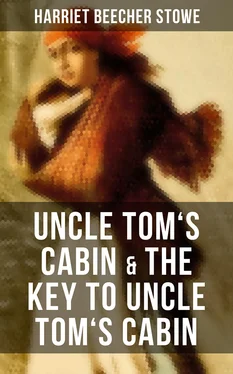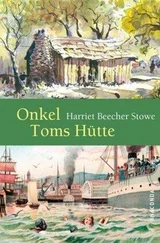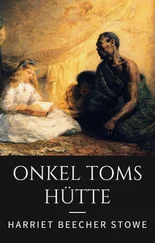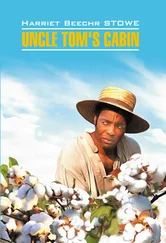Here the conversation was interrupted in a two-fold manner. St. Clare's voice was heard at the head of the stairs, asking Adolph if he meant to stay all night with his shaving-water; and Miss Ophelia, coming out of the dining-room, said,
"Jane and Rosa, what are you wasting your time for, here? Go in and attend to your muslins."
Our friend Tom, who had been in the kitchen during the conversation with the old rusk-woman, had followed her out into the street. He saw her go on, giving every once in a while a suppressed groan. At last she set her basket down on a doorstep, and began arranging the old, faded shawl which covered her shoulders.
"I'll carry your basket a piece," said Tom, compassionately.
"Why should ye?" said the woman. "I don't want no help."
"You seem to be sick, or in trouble, or somethin'," said Tom.
"I an't sick," said the woman, shortly.
"I wish," said Tom, looking at her earnestly,—"I wish I could persuade you to leave off drinking. Don't you know it will be the ruin of ye, body and soul?"
"I knows I'm gwine to torment," said the woman, sullenly. "Ye don't need to tell me that ar. I 's ugly, I 's wicked,—I 's gwine straight to torment. O, Lord! I wish I 's thar!"
Tom shuddered at these frightful words, spoken with a sullen, impassioned earnestness.
"O, Lord have mercy on ye! poor crittur. Han't ye never heard of Jesus Christ?"
"Jesus Christ,—who's he?"
"Why, he's the Lord," said Tom.
"I think I've hearn tell o' the Lord, and the judgment and torment. I've heard o' that."
"But didn't anybody ever tell you of the Lord Jesus, that loved us poor sinners, and died for us?"
"Don't know nothin' 'bout that," said the woman; "nobody han't never loved me, since my old man died."
"Where was you raised?" said Tom.
"Up in Kentuck. A man kept me to breed chil'en for market, and sold 'em as fast as they got big enough; last of all, he sold me to a speculator, and my Mas'r got me o' him."
"What set you into this bad way of drinkin'?"
"To get shet o' my misery. I had one child after I come here; and I thought then I'd have one to raise, cause Mas'r wasn't a speculator. It was de peartest little thing! and Missis she seemed to think a heap on 't, at first; it never cried,—it was likely and fat. But Missis tuck sick, and I tended her; and I tuck the fever, and my milk all left me, and the child it pined to skin and bone, and Missis wouldn't buy milk for it. She wouldn't hear to me, when I telled her I hadn't milk. She said she knowed I could feed it on what other folks eat; and the child kinder pined, and cried, and cried, and cried, day and night, and got all gone to skin and bones, and Missis got sot agin it and she said 't wan't nothin' but crossness. She wished it was dead, she said; and she wouldn't let me have it o' nights, cause, she said, it kept me awake, and made me good for nothing. She made me sleep in her room; and I had to put it away off in a little kind o' garret, and thar it cried itself to death, one night. It did; and I tuck to drinkin', to keep its crying out of my ears! I did,—and I will drink! I will, if I do go to torment for it! Mas'r says I shall go to torment, and I tell him I've got thar now!"
"O, ye poor crittur!" said Tom, "han't nobody never telled ye how the Lord Jesus loved ye, and died for ye? Han't they telled ye that he'll help ye, and ye can go to heaven, and have rest, at last?"
"I looks like gwine to heaven," said the woman; "an't thar where white folks is gwine? S'pose they'd have me thar? I'd rather go to torment, and get away from Mas'r and Missis. I had so," she said, as with her usual groan, she got her basket on her head, and walked sullenly away.
Tom turned, and walked sorrowfully back to the house. In the court he met little Eva,—a crown of tuberoses on her head, and her eyes radiant with delight.
"O, Tom! here you are. I'm glad I've found you. Papa says you may get out the ponies, and take me in my little new carriage," she said, catching his hand. "But what's the matter Tom?—you look sober."
"I feel bad, Miss Eva," said Tom, sorrowfully. "But I'll get the horses for you."
"But do tell me, Tom, what is the matter. I saw you talking to cross old Prue."
Tom, in simple, earnest phrase, told Eva the woman's history. She did not exclaim or wonder, or weep, as other children do. Her cheeks grew pale, and a deep, earnest shadow passed over her eyes. She laid both hands on her bosom, and sighed heavily.
CHAPTER XIX
Miss Ophelia's Experiences and Opinions Continued
Table of Contents
"Tom, you needn't get me the horses. I don't want to go," she said.
"Why not, Miss Eva?"
"These things sink into my heart, Tom," said Eva,—"they sink into my heart," she repeated, earnestly. "I don't want to go;" and she turned from Tom, and went into the house.
A few days after, another woman came, in old Prue's place, to bring the rusks; Miss Ophelia was in the kitchen.
"Lor!" said Dinah, "what's got Prue?"
"Prue isn't coming any more," said the woman, mysteriously.
"Why not?" said Dinah, "she an't dead, is she?"
"We doesn't exactly know. She's down cellar," said the woman, glancing at Miss Ophelia.
After Miss Ophelia had taken the rusks, Dinah followed the woman to the door.
"What has got Prue, any how?" she said.
The woman seemed desirous, yet reluctant, to speak, and answered, in low, mysterious tone.
"Well, you mustn't tell nobody, Prue, she got drunk agin,—and they had her down cellar,—and thar they left her all day,—and I hearn 'em saying that the flies had got to her,—and she's dead!"
Dinah held up her hands, and, turning, saw close by her side the spirit-like form of Evangeline, her large, mystic eyes dilated with horror, and every drop of blood driven from her lips and cheeks.
"Lor bless us! Miss Eva's gwine to faint away! What go us all, to let her har such talk? Her pa'll be rail mad."
"I shan't faint, Dinah," said the child, firmly; "and why shouldn't I hear it? It an't so much for me to hear it, as for poor Prue to suffer it."
"Lor sakes! it isn't for sweet, delicate young ladies, like you,—these yer stories isn't; it's enough to kill 'em!"
Eva sighed again, and walked up stairs with a slow and melancholy step.
Miss Ophelia anxiously inquired the woman's story. Dinah gave a very garrulous version of it, to which Tom added the particulars which he had drawn from her that morning.
"An abominable business,—perfectly horrible!" she exclaimed, as she entered the room where St. Clare lay reading his paper.
"Pray, what iniquity has turned up now?" said he.
"What now? why, those folks have whipped Prue to death!" said Miss Ophelia, going on, with great strength of detail, into the story, and enlarging on its most shocking particulars.
"I thought it would come to that, some time," said St. Clare, going on with his paper.
"Thought so!—an't you going to do anything about it?" said Miss Ophelia. "Haven't you got any selectmen, or anybody, to interfere and look after such matters?"
"It's commonly supposed that the property interest is a sufficient guard in these cases. If people choose to ruin their own possessions, I don't know what's to be done. It seems the poor creature was a thief and a drunkard; and so there won't be much hope to get up sympathy for her."
"It is perfectly outrageous,—it is horrid, Augustine! It will certainly bring down vengeance upon you."
"My dear cousin, I didn't do it, and I can't help it; I would, if I could. If low-minded, brutal people will act like themselves, what am I to do? they have absolute control; they are irresponsible despots. There would be no use in interfering; there is no law that amounts to anything practically, for such a case. The best we can do is to shut our eyes and ears, and let it alone. It's the only resource left us."
Читать дальше












